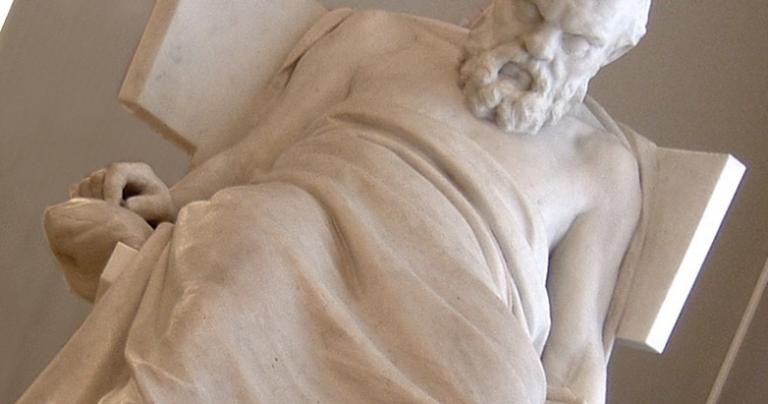 Socrates made many people mad and ended up dying for his love of wisdom. His martyrdom can cover up the fact that sometimes (as Plato presents him) Socrates can be very annoying. Socrates admits he is not wise, but we sometimes assume he does not mean it. He means it. He looks for the truth, tries to understand ideas, but looking can be messy especially when he meets an expert who is not really an expert!
Socrates made many people mad and ended up dying for his love of wisdom. His martyrdom can cover up the fact that sometimes (as Plato presents him) Socrates can be very annoying. Socrates admits he is not wise, but we sometimes assume he does not mean it. He means it. He looks for the truth, tries to understand ideas, but looking can be messy especially when he meets an expert who is not really an expert!
Imagine a teacher who does not know his stuff selling credentials for money. It’s easy if you try! Now imagine a truth-seeker finding such a person and trying to carry on a conversation. The sophist cannot admit he does not know what he has been claiming to know or his business will be ruined. Socrates will keep pressing his questions, but the conversation will never be any good, because the sophist cannot be sincere. A good conversation requires everyone involved to want the truth and to say what he or she actually thinks.
One of the worse sort of Socratic discussions takes place when Socrates meets someone who is not going to change his mind regardless of what is discovered. In Republic, Socrates gets no place with an old man named Cephalus, because Cephalus is mentally inflexible. Cephalus believes he knows, does not know, but is not going to change is false belief! A good conversation requires everyone involved to want the truth and to be willing to change his or her mind. A great conversation may see a better idea “win,” but will have no people who are losers! Everyone gains when better ideas replace worse ideas.
Cephalus leaves his son in charge of the argument and things get even worse. Why? The young man, Polemarchus, is very spirited, but cannot follow a discussion. He is quick to answer and easily confused. He does not argue, but passively follows the line Socrates takes, even when Socrates has missed the mark. At several points, the good reader of Republic will shout responses Polemarchus should make to Socrates’ questions.
Note that this is just what the great teacher, Plato, wishes us to do! He provokes us to respond to his characters (Socrates and Polemarchus) and so our discussion about the discussion can end up better than the one he has created! Plato creates text that must be approach honestly. He might bore the reader: Why? You might think Socrates has the worst of it: What does that mean? The text is there to provoke a living dialogue in us, if it does not then it is being misused.
After all, Plato could just have listed his arguments for his beliefs and he does not. He embeds his ideas in dialogues. Yet many readers of the text of Republic act like Polemarchus. We follow the text without pushing back. We do not take time to map out the arguments and see what we think of them. Some of us (God help us) are like Cephalus, read the text, and simply compare the ideas we find there to what we already know is true. Degenerate forms of Christian “worldview” training can turn into a Cephalus ignoring interaction with ideas, because the worldview trainer simply assumes he knows what is right.
A good conversation does need everyone to be spirited, into the dialogue, but also all the parties must work hard on the arguments.
Leaving the argument to the direction of one sage, even Socrates, is contrary to what Socrates taught! Let’s have better discussion . . .
———————————————-
*I begin an informal summer reading of Republic using Scott/Sterling (a new translation for me). Part 1. Part 2. Part 3. Part 4. Part 5. Part 6. Part 7. Part 8. Part 9. Part 10. Part 11. Part 12. Part 13. Part 14. Part 15.
**I have no idea how much of what I know is just Professor Al Geier filtered through my eccentricity. Here is to you Al!













